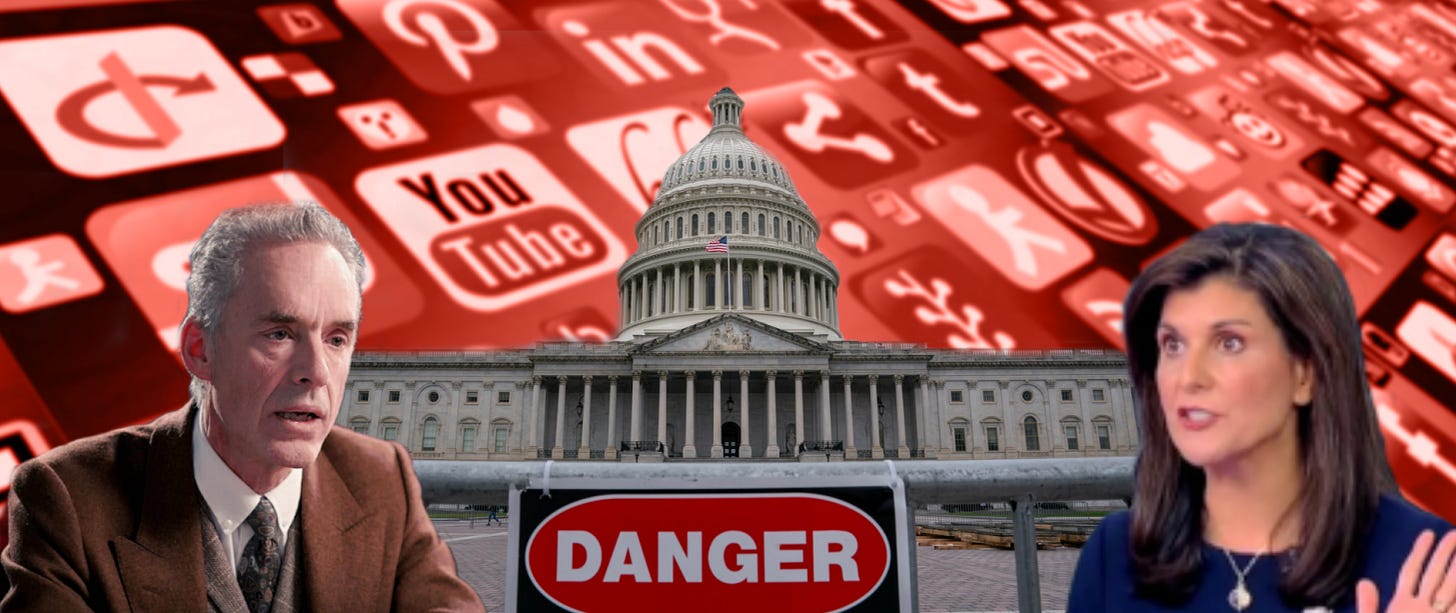Papers Please: The Attack on Online Privacy
Undermining online anonymity enables tyranny
Leaping at Shadows
Calls to end anonymity on social media are not new, but every once in a while they return as tensions rise. These renewed calls will suggest more extreme measures against platforms that allow even mere pseudonymity, much less complete anonymity. These proposals aim to ensure that the cost of communication with others, or even the public will be privacy. The argument presumes that if everyone was forced to have everything recorded in their real name, then interactions online would always be more civil and productive.
This is a very disingenuous argument. Seemingly polite and efficient communications under one set of assumptions, at one time, may be seen in an entirely different context years later. Forcing people to speak only with their real names forces all communication to be contextualized within real-life power struggles. To say it a different way, the progressive leftists are correct that free speech isn’t free speech if it’s constrained by social status and institutional forces. Where they tend to go wrong is that they believe that building a new “equitable” social hierarchy and institutional structure on top can resolve this conflict.
What they misunderstand, but the establishment power players do understand quite well is that online anonymity changes the game. The cypherpunks had the right idea, give the people privacy and we can liberate ideas from the humans they’re temporarily attached to. You may have heard “If voting ever really made a difference, they would make it illegal!”, with that in mind you might reconsider why online anonymity is such a threat to power. Despite being around for quite a while, people tend to misunderstand what social media is.
There is limitless information online, more media than you could ever watch or listen to in many lifetimes. People do need a layer to discover, prioritize and share that content. One of the things that made social media immediately successful was to receive content made by, or suggested by your trusted contacts. Over time, platforms moved to monetize that trusted attention and started taking over people’s feeds. This has lead to many people forgetting what good social media ever was in the first place. With state censorship and corporate surveillance the deal has only gotten worse and worse over time.
But hypothetically, the fact that you still can get information from others near and afar, friend and foe alike is immensely powerful. Being able to learn from those who don’t share your background can help broaden your perspective and make you empathize with those you may not otherwise. Being able to receive information from others across space and time without governments or corporations interfering is the gamechanger that the powerful fear the most. This is why you should be not just suspicious, but outright disgusted at those who wish to restrict all communication to real names only.
This is why journalists have procedures to protect whistleblowers, who must remain anonymous to keep them safe from retaliation. Unfortunately, as media institutions become corrupted, so too does their ability to properly platform those wishing to fight abuse. A problem with this is that while one may have important information, it may be seen as not worthy of a particular journalists time. We should be grateful that there are tools that can help whistleblowers speak to the public directly without risking their identity and safety. It’s frustrating to see the calls for transparency only go in one direction. The policy position is clear: “Privacy for me, but not for thee”
What’s in a Name?
It is quite convenient that the people who often advance calls to undermine privacy are those who have already established profitable personas within the established orthodoxy. When one speaks out in their own name, (as I do) there is a price being paid to do so. Naturally one is open to criticism and attacks, but also the internet never forgets. We are in a time where one’s public positions are always known once they are known. We would all do well to be careful with what we wish to attach our names to. This is often why those who choose to speak out in their names receive significant praise and trust. After all, if one is willing to stake their entire reputation on an issue, they must always be a strong incorruptible champion. The trouble though, is that things don’t always work out that way.
Not everyone can afford to risk their income, or even their lives, to dissent against power. While there will always be a lucky few, who are able or willing to take that risk, imposing it on others will simply reduce the amount of people willing to speak out. It would be a mistake to restrict all speech to those who can afford to take the risk of speaking in their name. Protecting online privacy allows for more people to speak out about more things. It’s very possible that there are people in positions to reveal damning secrets, but don’t feel safe pointing others to the truth. From top secret institutions, to corporations, and even families, it’s critical that there is always a channel for people to speak out about abuse, especially of the vulnerable. It should be our top priority to ensure that it’s possible to correct grave wrongs.
For the majority of the public, the information landscape has significantly consolidated around a few major services. With the exception of those who have already fled to decentralized alternatives, the majority of social media users have their attention constrained to a couple of corporate controlled entities. Those entities are under pressure of more state control to direct that attention. This means that anyone choosing to speak out in their name has to be careful about how they use their limited resources to make an impact. Those with power and influence can easily bribe, flatter, or otherwise compromise those with a large following. One may have a critical message to share, but the means they use to disseminate it can be quite restrictive.
To make things worse, using real names doesn’t eliminate the worst of abuse and hostility. Hate and rage is often freely expressed (and sometimes rewarded) when taken out on officially sanctioned targets, creating scenarios where those speaking out in their names are likely to be more cruel than one can be without naming themselves. When people are attacked by those with a well-known identity, it can often be more personal than a few low-effort attacks from trolls. This gets worse when everyone has to be named. Without the choice of opt-ing out of giving up your identity, you are forced to run the risk of eventually being turned into an “acceptable target” with no recourse.
This is true of taken names as well. Pseudonymity doesn’t protect against attacks, slander, sanction or almost any other measure that can silence a real name. The major advantages of using a pseudonym is that your content can be disconnected from you as a person, and that your pseudonym is disposable. In fact, using a pseudonym instead of your real name was generally considered to be basic internet safety until social media companies started selling your data. When one demands all pseudonyms be unmasked, I ask: “What gives you the right to demand everyone’s personal information?”. Because unlike a pseudonym, your real name isn’t disposable.
This is not to say that there shouldn’t be places where people choose to interact with their real names, but we should vehemently resist a one-size-fits-all imposition. Shoving anonymity and pseudonymity out of real-discussions won’t improve things, but in fact is more likely to cause more radicalization and abuse. Discussions without real names attached can be less personal, so rational thought can take the wheel instead of heightened emotions. Emotions are part of the human experience. We should guide our thoughts and actions with love and compassion, just not at the expense of wrestling with difficult ideas.
Society Needs Its Radicals
Much of the desire to purge online spaces of privacy has to do with the idea of building a perception of proper care and etiquette. There is nothing wrong with an exclusive space curating their own ideal experience, the troubles come when that becomes the only permissible model. Unlike the real-life metaphors people will cling to, such as bars and concert halls, the internet practically has no space limits. Outside of the raw storage to hold media, and the bandwidth to carry it, there is no reason one space has to exist at the expense of another. What does happen, is that legacy institutions resist and attack attempts to build democratized competition.
Radicals and their wild ideas can challenge long-held assumptions that may no longer hold, or resolve an untenable contradiction. New ways of thinking, new ways of solving problems are always a threat to entrenched power. Not all wild ideas are good ones, but the only way to find out which ones is to give them a chance to be understood. The more an institution is build on assumption, the more vulnerable it is to being disrupted by new concepts and different views. This means that those institutions will treat those ideas as an existential threat, regardless of their merits.
The advantage of isolating ideas, is that they can move faster than people. You have permission to copy this text, and share it with your friends, and they have the same granted to them, and so on. If this caught on, this piece and it’s points would spread faster than any institution could keep up with. This is true of any written words, but we’re seeing it apply more and more to images, and video as digital technology advances. Anything that becomes detached from it’s origin and spread gets the benefit of being interpreted and reinterpreted from all kinds of different contexts. This can either add clarity, or refute the concept entirely.
Online and offline anonymity is worth protecting, but there’s so much more that we can do. If we really want to move on from corrupt institutions, captured governments, and hostile media, it’s possible we need to rediscover ways to cooperate without all the extra noise of who is who. A crucial task is building up tools, infrastructure, and projects that democratize information without compromising on people’s privacy. This is because with a bit of creativity, all of us can work together in ways that are impossible to shut down. A group of people working anonymously for a common purpose are significantly more expensive and complicated to infiltrate, bribe, or control. It’s really easy to manipulate and pick apart a few popular figures, or pit their fans against each other. Successfully building efficient bottom-up tools can create a win-win scenario: institutions either reform themselves to adapt to the new circumstances, or are made obsolete by new structures. Either way, the people can choose to move things in a better direction.









Very good article with well made arguments. Many started suspecting Jordan Peterson as being "paid opposition" when he started campaigning against anonymity on the internet, so I think folks get it.
It could be handled easily, but Twitter (I refuse to call it a letter of the alphabet) could include an "only people whose identities I have verified" feed option.
At some point, the system gets overly complex for the participation of the average person, and therein lies a challenging problem. The internet is the Wild West, and the Wild West simply is more dangerous.